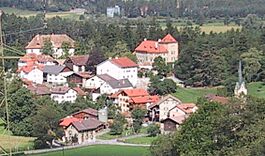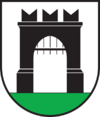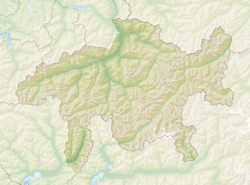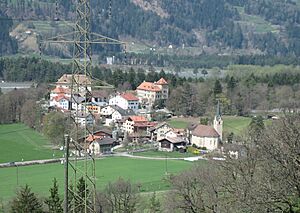Fürstenau, Switzerland facts for kids
Quick facts for kids
Fürstenau
|
||
|---|---|---|
 |
||
|
||
| Country | Switzerland | |
| Canton | Graubünden | |
| District | Viamala | |
| Area | ||
| • Total | 1.32 km2 (0.51 sq mi) | |
| Elevation | 650 m (2,130 ft) | |
| Population
(Dec 2020 )
|
||
| • Total | 350 | |
| • Density | 265/km2 (687/sq mi) | |
| Postal code |
7414
|
|
| Surrounded by | Almens, Cazis, Pratval, Scharans, Sils im Domleschg, Thusis | |
Fürstenau (in Romansh: Farschno) is a small town in Switzerland. It is located in the Viamala Region in the canton of Graubünden. Fürstenau is special because it is the smallest town in Switzerland that has "city rights." This means it was given special permission to hold markets. This right was granted by Charles IV, Holy Roman Emperor in 1354.
Contents
A Look Back: Fürstenau's History
Fürstenau was first mentioned in old writings in the year 1257. Back then, it was known as Fúrstenowo or Furstinowe.
In the Middle Ages, there were two tall tower houses here. These were like guard towers. There was also a house for the bishop. The bishop's summer home was the main reason Fürstenau received its special city rights.
Geography: Where is Fürstenau?
Fürstenau covers an area of about 1.3 square kilometers (0.5 square miles). A little over half of this land, about 52%, is used for farming. Forests cover about 32% of the area.
Buildings and roads take up about 9% of the land. The rest, about 6%, is made up of rivers or mountains.
Before 2017, Fürstenau was part of the Domleschg area. Now, it is part of the Viamala Region. The town includes the main village of Fürstenau and a smaller area called Fürstenaubruck. This part is on the right side of the valley.
People of Fürstenau: Demographics
Fürstenau has a population of 350. In 2008, about 8% of the people living here were from other countries. Over the last ten years, the number of people living in Fürstenau has grown by about 12.5%.
In 2000, the population was almost evenly split between males and females. About 49% were male and 51% were female.
Age Groups in Fürstenau
Here is a look at the age groups in Fürstenau from the year 2000:
- About 9% of the people were children aged 0 to 9 years old.
- Around 5% were between 10 and 14 years old.
- About 4% were teenagers aged 15 to 19.
- For adults, about 9% were 20 to 29 years old.
- Around 16% were 30 to 39 years old.
- About 12% were 40 to 49 years old.
- Around 14% were 50 to 59 years old.
- For older adults, about 8% were 60 to 69 years old.
- Around 9% were 70 to 79 years old.
- About 11% were 80 to 89 years old.
- And about 3% were 90 to 99 years old.
Education and Work
Most adults in Fürstenau have a good education. About 81% of people aged 25 to 64 have finished high school. Many have also gone on to higher education, like university.
Fürstenau has a low unemployment rate, which means most people who want to work can find jobs. In 2005, a few people worked in farming. A very small number worked in manufacturing. Most people, about 133, worked in the service industry. This includes jobs like tourism, shops, and offices.
Population Changes Over Time
The table below shows how Fürstenau's population has changed through history:
| year | population |
|---|---|
| 1803 | 107 |
| 1850 | 304 |
| 1900 | 235 |
| 1950 | 253 |
| 1980 | 198 |
| 2000 | 311 |
Exploring Fürstenau: Sights to See
Fürstenau is home to three important Swiss heritage sites. These places are considered very important to the country's history and culture.
Famous Buildings in Fürstenau
The Haus Stoffel, the Oberes Schloss (Upper Castle), and the Unteres Schloss (Lower Castle) are all listed as Swiss heritage sites. The Lower Castle is also known as the Bishop's Castle.
As of 2014, the Upper Castle (Oberes Schloss) is a famous inn. It has a restaurant that has received three Michelin stars, which means it is a very highly rated place to eat.
Languages Spoken in Fürstenau
Most people in Fürstenau speak German. There is also a small group of people who speak Romansh. A smaller number speak Italian.
In 2000, about 92% of the people spoke German. Romansh was spoken by about 3% of the population. Italian was spoken by about 2%.
| Languages | Census 1980 | Census 1990 | Census 2000 | |||
|---|---|---|---|---|---|---|
| Number | Percent | Number | Percent | Number | Percent | |
| German | 170 | 85.86% | 243 | 89.66% | 287 | 92.28% |
| Romanish | 13 | 6.57% | 15 | 5.54% | 10 | 3.22% |
| Italian | 10 | 5.05% | 4 | 1.48% | 6 | 1.93% |
| Population | 198 | 100% | 271 | 100% | 311 | 100% |
See also
 In Spanish: Fürstenau (Grisones) para niños
In Spanish: Fürstenau (Grisones) para niños
 | May Edward Chinn |
 | Rebecca Cole |
 | Alexa Canady |
 | Dorothy Lavinia Brown |








